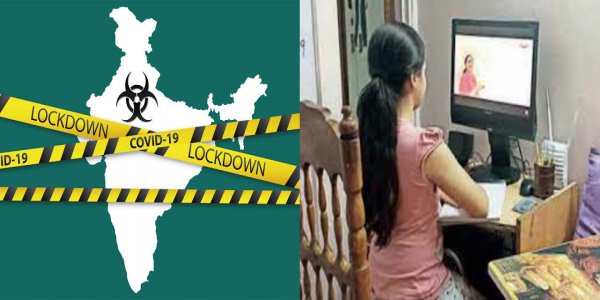Post Covid-19: The new normal in education can only be imagined
Mohd. Naushad Khan ,

Journalist , Delhi
Covid-19 has impacted every individual and institution including education in one way or the other and will continue to do so for few months more. Management of institutions, Universities, colleges and even schools have tried to bridge the gap resulting due to pandemic and lockdown through online academic sessions. Many believe that it can hardly satisfy those who still believe in traditional method of teaching and learning.
Even after complete relaxation in lockdown there is no clarity as to when the campuses would be unlocked and to what extent learning process would be impacted as a result. Be it online learning or study in the campuses the atmosphere is relatively adverse because the mind is not free from the hazards of the pandemic. Pandemic fear psychosis is prevalent and it is most likely to impact education at all levels.
There can be institutions having expertise in technology based learning but most of them have only used it to cover the semester without giving second thought on the knowledge they were trying to impart. It will certainly take time for teachers and the students to cope up with the challenges ahead in educational sphere. Too much of anxiety, stress and fear have no doubt harmed the process of acquiring knowledge and implementing it lucratively. People are reacting positively or negatively to this changed method of teaching and learning. But many who are not even well versed in technology and have not yet paced up with digital transformation are also trying to adapt to the changing scenario gradually.
According to Viplav Baxi who is Director, Product and Digital Transformation, at Oxford University Press (OUP), and an education researcher with about 24 years of experience in e-learning and technology, “The pandemic has brought about an increased awareness, acceptance and skill around online learning and teaching. Different groups have formed positive or negative mindsets about this change by now, based on their actual use of and experience with edTech solutions. Some of these issues are quite genuine and some are a result of a lack of understanding of what the medium can or should really do. Doubtless a large part of teaching and learning in the conventional space is going to revert back to traditional ways when it can, but there will be a significant and persistent upwards shift in this sector even when the dust settles.”
“That this shift can be more prominent than less lies in our hands to shape. That it could be a transformative change, or a missed opportunity, is ours to carve out. We cannot glide over the role of edTech in the National Education Policy like we have. We cannot afford to invest in digital infrastructure for our citizens. We have to stop conflating ICT with edTech. We cannot afford lack of edTech capabilities in the people and institutions that build policy or drive education in our country – whether K12, Higher Ed, Vocational, Distance or institutional. We cannot crudely transpose brick and mortar pedagogies online and ignore the role of digital pedagogy. We cannot train our teachers in the same ways we train our students. We have to create new career progression paths for them and build their skills in the digital space,” he said.
On the way forward, Baxi said, “We have to invest in R&D and a country tech stack on edTech. We have to devise and employ world-class standards for digital learning and not be contented with just extending some of the public learning initiatives we have undertaken in the past. We have to encourage regional content and multi-modal content. We have to roll out effective implementation mechanisms. These are critical pieces of any national edTech strategy, without which we stand very little chance of providing effective educational value and impact to all through the use of edTech. This is not just true for India, but it is applicable for the entire world.”
The lockdown was a natural step seeing people’s life in danger. An abrupt and long lockdown across all countries of the world, with an exception of only a few, may have helped delaying the contagion and thus saving life but in the most immediate terms it threatened livelihood and most critically, in the context of higher education, learning. Compelled by the circumstances, the lockdown has been eased to revive the economy and thus restore livelihood. But the campuses are taking all the more time to come up to life.
The most immediate response of higher educational institutions to the onslaught of covid-2019 was to temporarily shut down the campuses completely and move toward enabling learning through online, virtual and remote processes. The campuses that already had some kind of learning management system in place found it easy to adjust their teaching, learning, examination and evaluation for the whole bunch of their students. But even those campuses and that comprised a predominant majority of the institutions that had no or minimal prior experience of technology enabled-technology based learning had to resort to the technology, though they had no strategy and they just started using a wide variety of available tools to communicate with their students and completed the semester.
“Though all Higher Education Institutions are claiming to have conducted their classes and teaching but deep within the institutions, the teachers and the students do realise that there have been serious compromises in the teaching-learning processes. While technology companies have profited from the situation, the online education providers see a very good prospect for themselves. But the mainstream campuses are still struggling with various kinds of uncertainties. They are yet not sure whether they would be able to conduct examination for the final outgoing semester. Many do not think that it would be possible and the students are also not keen they want to be promoted on the basis of their past performance at least a majority of them,” said Prof. Furqan Qamar, Professor of Management, Centre for Management Studies (CMS), Jamia Millia Islamia (JMI) and former Vice-Chancellor of University of Rajasthan and Central University of Himachal Pradesh and has also served as the Secretary General of the Association of Indian Universities (AIU).
“There are also uncertainties about the admission for the next session so is the case with regard to the career progression and placement of the students. It appears, that even the next semester would also have to be run online, majorly, if not fully. Universities may start experiencing financial difficulties – private ones because of the decline in admission and unwillingness of students to pay the same level of fees as they were paying before. Public universities too may experience reduction in financial resources because the grant would be dependent on the resource availability with the governments,” said Furqan Qamar.
On the post Covid-19 scenario, Prof Qamar said, “Teachers in private colleges and universities are already jittery about the continuity of their job. International students shall decline for sure but India is not going to be affected much by that because international students have hardly been any significant source of university revenue. Past experiences and optimism mandates that we should believe that we shall survive Covid-2019. But Post- Covid-2019, the life would not be normal in the same sense which we had been known to so far. The new normal can only be just guessed.”
The Corona Virus pandemic has seriously impacted the higher education globally. It has further expanded the gaps between the haves and have-nots and posing further challenges to the right to equality which is the norm of the Indian constitution. As the low-income students fall behind as their high-income peers attend enrichment camps or read easily accessible books. The long absence educational institutions caused by the COVID-19 pandemic are likely to leave less advantaged students with even more ground to make up. This is affecting more seriously to younger learners. That may seriously impact the learning experiences for their entire lives. If it is not rectified in time, it’s going to have disastrous impacts.
“Once the serious process of the pandemic recedes and society adapts to new normal, academicians and administrators will need to take steps to get students back on track, with strategies that could include summer school, longer school hours or school on Saturdays. Financial support to those catch-up activities will be an entirely different as the nation slides into the worst economic recession. Universities and professional academic organisations have scrambled to switch to online teaching in the face of lock-downs and closures. But low-income students might lack access to internet and digital devices and a suitable place to study and support from family members. It creates further challenges for them to keep pace with the changing time,” said Dr Tabrez Ahmad, Pro Vice Chancellor & Dean, School of Law, at GD Goenka University.
Dr Tabrez added, “Post-lock-down the students who are immune-compromised or otherwise at risk of serious infection may also lag behind. The technology enabled processes like use of telepresence robots – may also gain more recognition. The peer learning, physical education, skill-oriented learning, camaraderie and sense of belonging are going down. The students who have less ability to self-regulated learning with no teacher providing in-person support will suffer a lot. Now India needs to seriously recognize and implement the requirements of digital devices and some kind of broadband internet access to the needy students as a public utility. The rapid, pandemic-prompted to moving course materials online – will, no doubt, have long term very positive impacts.”




